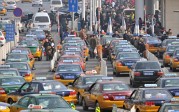Compared with their counterparts in other regions, taxi drivers in Chongqing, Hainan and Gansu province, are indeed lucky. In recent strikes launched by some taxi drivers in the three regions, they got a quick response from the local authorities and their problems resolved. The taxi drivers went on strike against rental fees and unlicensed competition, issues that have been plaguing them for some time. The drivers were given the opportunity to have their representatives speak about their complaints to top local officials. It was a rare opportunity. Their counterparts in other regions, facing similar problems, have not yet had their problems acknowledged.
We still remember the slightly nervous appearance of representatives of the taxi drivers during a face-to-face meeting with Bo Xilai, chief of the Chongqing municipal Party committee. Some taxi drivers in the southwestern municipality went on strike on Nov 3 in protest against a rise in rental fees by their companies from 5,000 Yuan ($735) to 7,000 Yuan per month and against unfair competition from the growing number of unlicensed taxis. The drivers complained their already low income would be reduced even further. Bo, also a member of the Political Bureau of the CPC Central Committee, was probably the highest-ranking official the representatives had met in their lives. Bo criticized local taxi companies for raising the rental fees and urged them to revert to the previous fees. He listened carefully to the representatives and assured them that their problems would be resolved. Similar strikes have occurred in Sanya and Yongdeng by irritated taxi drivers. While hailing the results in the three regions however, another concern emerges: Is this a way to resolve similar problems in other regions, or even to resolve all social problems? The strikes have offered much food for thought on ways to resolving simmering problems that exist in the taxi trade. |
First of all, would taxi drivers still choose to take to the streets if they had a good channel to express their grievances to the relevant departments? The answer is no. "The long-standing conflicts over management systems, industry guidance, and the distribution of profit have led to a shaky environment for the entire industry and its employees," the All China Federation of Trade Unions said in a recent statement. | 
|
"Taxi drivers don't have good or suitable channels for voicing their complaints, and this has resulted in frequent incidents. "The taxi industry has been urged to set up union branches which will protect the interests of drivers and companies and can be used as collective bargaining mechanisms.As a protector of the rights and interests of grassroots workers, the union's statement should be welcomed and is expected to accelerate the formation of a trade union system nationwide. The occurrence of incidents across the country in the past also shows that any minor issue could escalate into a more serious one without an effective mode of communication. In their latest strikes, competition from illegal taxis seems to have become a major issue. It is true competition between licensed and unlicensed taxis drivers is unfair. The former are required to pay the majority of their daily earnings to their companies. In Chongqing, there are about 2,000 unlicensed taxis competing with 3,000 licensed ones. And in Sanya, the number is about twice the 1,200 licensed ones.
Local authorities in Chongqing, Sanya and Yongdeng have all promised to crack down on unlicensed taxi operators. It is only fair the governments come up with viable measures to prevent such unfair competition. However, any violations of the interests of these unlicensed drivers should be avoided. It is reported that most of them are laid-off workers or unemployed farmers. Also, the main reason that most of them have turned to unlicensed operations is because they cannot afford the high cost of being a licensed driver or get a license from taxi companies-monopolized quotas.
We are not surprised about the animosity licensed taxi drivers have toward the unlicensed ones. They have paid an enormous amount in order to access to the market and thus have reasons to demand a reasonable and fair market. However, to pursue such a market environment does not necessarily mean the legitimacy of eliminating unlicensed cabbies from the market. Then the problem arises: Without elimination of unlicensed operators, how can we guarantee the interests of licensed ones? This problem then gives rise to another one: Why can taxi companies ask for such high rental fees from their drivers, and should this system be legal?
It is commonly known that driving a taxi is not a sophisticated profession, so any individual with the necessary skills or qualifications should be allowed access to the industry. It is common in other countries that a basic set of entry standards are established to open the taxi market to all qualified candidates, while the government or relevant industrial associations are only responsible for its supervision and management.
The taxi industry should now be rejuvenated so that its development has benefits to both the drivers and community which they serve. Xinxiang, a city in Henan province, has set an example for reform of the taxi industry. In this city, individuals are allowed to bid for taxi quotas by avoiding dealing with taxi companies. And they are free to choose whether they wish to operate independently or under an industrial association which charges every taxi driver a symbolic 500 yuan each year as a service and management fee. |